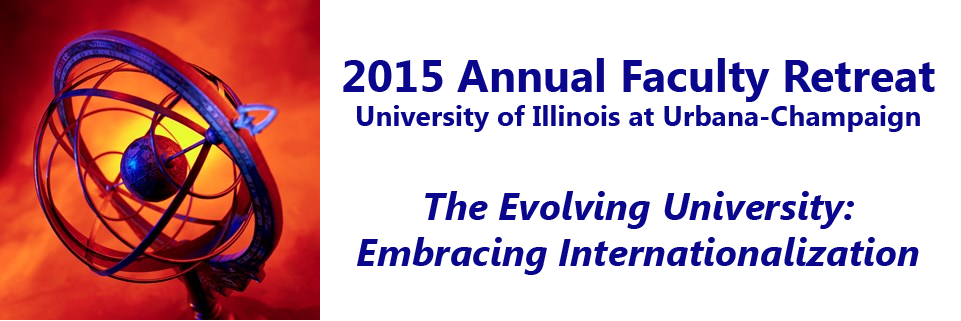Intercultural Competence: Darla Deardorff at Illinois' Faculty Retreat
by Ann Abbott
For years I have been reading Darla Deardorff's work on intercultural competence. That's why I was so excited to see that she was going to be the keynote speaker at this year's campus-wide Faculty Retreat.
In languages, we're always thinking about and working with intercultural competence (or transcultural competence, as the MLA 2007 Special Report called it). However, other disciplines and the university as a whole have begun to give it much more thought, especially because of the increasing numbers of international students on campus. So this was a wonderful occasion to bring campus-level focus to an issue that I (and others in languages) care deeply about.
She provided a very helpful handout to us, and I'll share here some of my notes as well as information from the handouts.
For years I have been reading Darla Deardorff's work on intercultural competence. That's why I was so excited to see that she was going to be the keynote speaker at this year's campus-wide Faculty Retreat.
In languages, we're always thinking about and working with intercultural competence (or transcultural competence, as the MLA 2007 Special Report called it). However, other disciplines and the university as a whole have begun to give it much more thought, especially because of the increasing numbers of international students on campus. So this was a wonderful occasion to bring campus-level focus to an issue that I (and others in languages) care deeply about.
She provided a very helpful handout to us, and I'll share here some of my notes as well as information from the handouts.
Myths about intercultural competence (handout)
- Students fluent in another language are interculturaly competent.
- Intercultural competence means mostly learning about others' cultures.
- One class, reading, lecture, or workshop is sufficient for addressing intercultural competence.
- Send students abroad and they'll come back interculturaly competent.
- Intercultural competence can be measured by one assessment tool.
In thinking about incorporating this into my teaching, I would translate these five myths into Spanish and use them as a warm-up, asking students to write true/false.
Models of intercultural competence (handout)
- Allport (1954): Contact Hypothesis. She said that this model was old, but still very relevant.
- Bennet (1993): Developmental Model of Intercultural Sensitivity. (At the link, toggle back and forth between Bennet's model and Deardorff's model.) She pointed out that at Stage 6 of this model (Integration), she sees an increasing number of students/youth who are Third Culture Kids (TCK), also known as Global Nomads.
- Deardorff (2009): Intercultural Competence Framework. (Again, toggle back and forth to see this model which is also pictured below.)
Intercultural Competence: Self-Reflection
The handout included a nice sheet with 15 items (e.g., tolerance for ambiguity, culture-specific knowledge) that one should rate themselves on. Then you're asked to talk about them in concrete experience. This was from Building Cultural Competence by Berardo & Deardorff, Stylus, 2012.
From the same book, she also gave us a list of reflection questions about interculturally competent teaching with a helpful bibliography.
My notes
Here are a few notes I took.
- She used the example of people born with sunglasses. If you are born with yellow sunglasses (and so is everyone else around you), then you see someone with blue sunglasses, if you ask them if you can put them on, then what color will you see? Green. Not blue. Green. (Metaphor for culture and our own cultural filters.)
- She said that we should not live by the Golden Rule, but rather by the Platinum Rule: Do unto others as they would have you do unto them.
- When you assess intercultural competence, you must ask what is the evidence of student success in developing ICC? Then ask: what would employers say is evidence? This is an example of ICC being measured and assessed differently by various stakeholders, not just us as educators.
Implications for Assessing Intercultural Competence (handout)
- Use existing lit to define the concept of intercultural competence.
- Go beyond self report tools to assess ICC.
- Focus on process, not results.
- Intercultural learning involves a multimethod, multiperspective assessment process.
- ICC is about students learning to think and act interculturally.
Brainstorm
We were asked to leave notes on the table with our take-aways and
- Two action steps: 1) Put this as a learning objective on my syllabi. 2) Include ICC literature as a reading or exam item in my courses.
- One burning question: For me, the question is about ethics. What is it imperative that we teach ICC? If we don't, I feel that we are being unethical as educators and as a university. We have an ethical obligation to try to prevent the next Ferguson, to enhance understanding about Palestine, to engage students in the cultural perspectives of all marginalized groups. If we don't, what will happen to our world?





Comments
Post a Comment